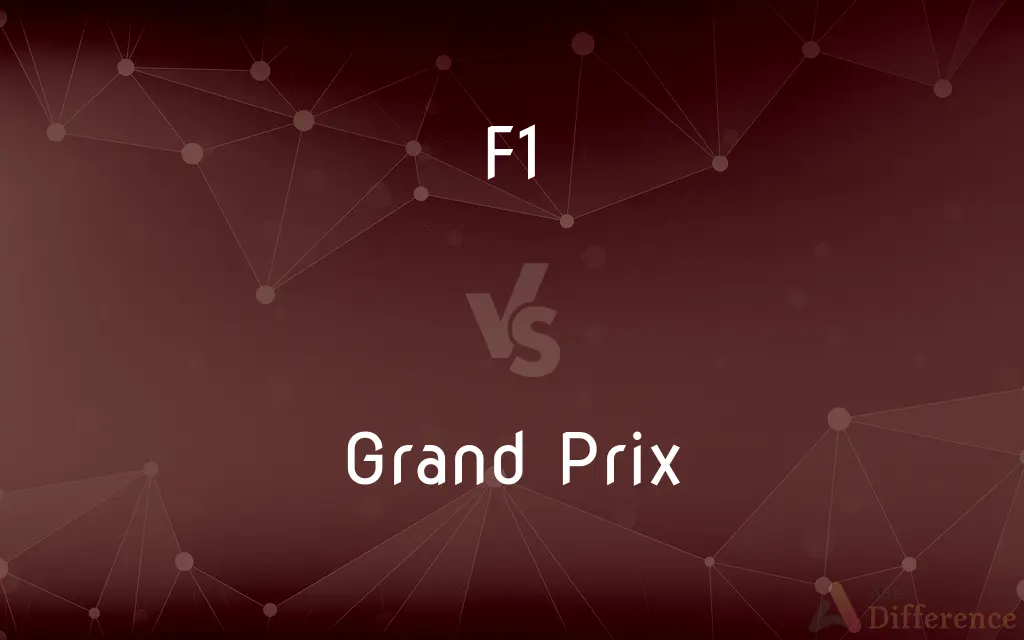F1 vs. Grand Prix — What's the Difference?
Edited by Tayyaba Rehman — By Fiza Rafique — Published on December 20, 2023
F1 refers to Formula One, the highest class of international auto racing, while Grand Prix denotes individual races within the F1 season and other motor racing events.

Difference Between F1 and Grand Prix
Table of Contents
ADVERTISEMENT
Key Differences
F1, short for Formula One, signifies the premier class of single-seater auto racing sanctioned by the Fédération Internationale de l'Automobile (FIA). Grand Prix, on the other hand, pertains to specific races, not only in the F1 calendar but in other motorsport events too.
While F1 delineates a championship, consisting of a series of races, the term Grand Prix addresses those particular races. An F1 season comprises multiple Grand Prix events.
The association between F1 and Grand Prix is symbiotic. F1 represents the overarching structure or organization, and the Grand Prix events are its integral components that cumulatively determine the championship winner.
F1 is universally acknowledged for its cutting-edge technology, with teams investing significantly in research and development. Every Grand Prix event within the F1 season offers teams an opportunity to test and showcase these advancements.
Both F1 and Grand Prix have historic significance. F1 has evolved as the pinnacle of motorsport over decades, while the term Grand Prix, which means "great prize" in French, has been used to denote motor racing events since the early 20th century.
ADVERTISEMENT
Comparison Chart
Definition
The highest class of international single-seater auto racing.
Specific races within F1 and other motorsport events.
Scope
Represents the entire championship series.
Represents individual races.
Relation
Overarching organization or structure.
Integral race events within the F1 season.
Technological
Associated with pinnacle of motorsport technology.
Each race is an opportunity to showcase this technology.
Historical Use
Evolved as the top tier of motorsport over decades.
Term has been used since early 20th century for racing events
Compare with Definitions
F1
Short for Formula One, sanctioned by the FIA.
The F1 championship is contested by the best drivers in the world.
Grand Prix
Each race contributes points to the F1 championship.
Winning a Grand Prix earns a driver 25 points.
F1
Represents a series of races across different countries.
The F1 calendar includes 22 races this year.
Grand Prix
Can refer to motor racing events outside of F1.
The motorcycle Grand Prix was thrilling to watch.
F1
Known for advanced technology and innovation.
F1 teams spend millions on research and development.
Grand Prix
An individual race within the Formula One season.
The Monaco Grand Prix is one of the most prestigious races.
F1
The highest class of international auto racing.
He dreamed of racing in F1 since he was a child.
Grand Prix
French for "great prize," denoting a motor race.
The first Grand Prix was held in France in 1906.
F1
A global championship determining the world champion driver and constructor.
The F1 standings are tight, with only a few points separating the top drivers.
Grand Prix
Traditionally held on a mix of public roads and closed circuits.
The street circuit for this Grand Prix is challenging for drivers.
Common Curiosities
What does Grand Prix mean?
Grand Prix, French for "great prize," refers to individual motor racing events, including those in the F1 calendar.
What is F1?
F1, or Formula One, is the premier class of international single-seater auto racing.
Is every Grand Prix related to F1?
No, while F1 races are Grand Prix events, there are Grand Prix races in other motor sports too.
How many Grand Prix events are in an F1 season?
The number can vary, but recent F1 seasons have included around 20-23 Grand Prix events.
What's the most prestigious Grand Prix in F1?
Many consider the Monaco Grand Prix as one of the most prestigious F1 races.
Can a non-F1 race be called a Grand Prix?
Yes, the term "Grand Prix" can be used for motor racing events outside of F1.
How has F1 evolved over the years?
F1 has seen technological advancements, safety improvements, and increased global reach since its inception.
Which country hosted the first Grand Prix?
The first Grand Prix was held in France in 1906.
How long has F1 been in existence?
The F1 World Championship began in 1950.
Who governs F1 races?
F1 races are governed and sanctioned by the Fédération Internationale de l'Automobile (FIA).
How do drivers score in F1?
Drivers earn points based on their finishing positions in each Grand Prix, contributing to the F1 championship standings.
Why is F1 technology significant?
F1 pushes the boundaries of automotive technology, often leading to innovations that eventually benefit road cars.
Are Grand Prix races only on race tracks?
No, Grand Prix events can be on dedicated race tracks, street circuits, or a combination of both.
Share Your Discovery

Previous Comparison
Stale Cheque vs. Post-Dated Cheque
Next Comparison
Carnot Cycle vs. Rankine CycleAuthor Spotlight
Written by
Fiza RafiqueFiza Rafique is a skilled content writer at AskDifference.com, where she meticulously refines and enhances written pieces. Drawing from her vast editorial expertise, Fiza ensures clarity, accuracy, and precision in every article. Passionate about language, she continually seeks to elevate the quality of content for readers worldwide.
Edited by
Tayyaba RehmanTayyaba Rehman is a distinguished writer, currently serving as a primary contributor to askdifference.com. As a researcher in semantics and etymology, Tayyaba's passion for the complexity of languages and their distinctions has found a perfect home on the platform. Tayyaba delves into the intricacies of language, distinguishing between commonly confused words and phrases, thereby providing clarity for readers worldwide.
















































